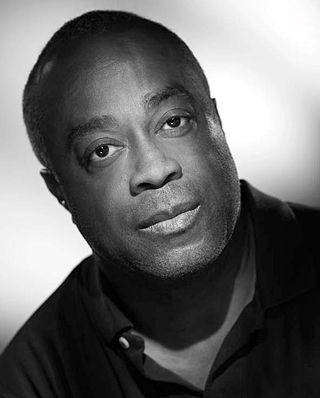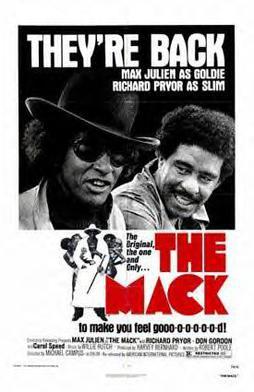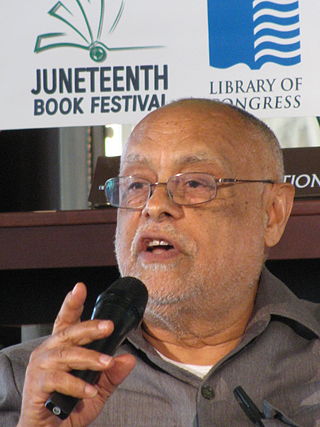Related Research Articles

Super Fly is a 1972 American blaxploitation crime drama film directed by Gordon Parks Jr. and starring Ron O'Neal as Youngblood Priest, an African American cocaine dealer who is trying to quit the underworld drug business. The film is well known for its soundtrack, written and produced by soul musician Curtis Mayfield. It was released on August 4, 1972.

Ron O'Neal was an American actor, director and screenwriter, who rose to fame in his role as Youngblood Priest, a New York City cocaine dealer, in the blaxploitation film Super Fly (1972) and its sequel Super Fly T.N.T. (1973). O'Neal was also a director and writer for the sequel, and for the film Up Against the Wall.

Charles Burnett is an American film director, film producer, writer, editor, actor, photographer, and cinematographer. His most popular films include Killer of Sheep (1978), My Brother's Wedding (1983), To Sleep with Anger (1990), The Glass Shield (1994), and Namibia: The Struggle for Liberation (2007). He has been involved in other types of motion pictures including shorts, documentaries, and a TV series.

The Mack is a 1973 American blaxploitation crime drama film directed by California native Michael Campus, starring Max Julien and Richard Pryor. The film also stars Oscar-nominee Juanita Moore and Tony-nominated actor Dick Anthony Williams. Filmed in Oakland, California the movie follows the rise and fall of Goldie, who returns from a five-year prison sentence to find that his brother is involved in Black nationalism. Goldie decides to take an alternative path, striving to become the city's biggest pimp.
Nathaniel Taylor was an American television and film actor best known for portraying Rollo Lawson on the 1970s sitcoms Sanford and Son, Grady and the 1980s sitcom Sanford.

Haile Gerima is an Ethiopian filmmaker who lives and works in the United States. He is a leading member of the L.A. Rebellion film movement, also known as the Los Angeles School of Black Filmmakers. Since 1975, Haile has been a film professor at Howard University in Washington, D.C. He is best known for Sankofa (1993), which won two awards.
Gordon Roger Parks Jr. was an American film director, best known for the 1972 film Super Fly.
Sig Shore was an American film director and producer. His 1972 film Super Fly is considered one of the first blaxploitation films.

Blaxploitation is an ethnic subgenre of the exploitation film that emerged in the United States during the early 1970s, when the combined momentum of the civil rights movement, the Black power movement, and the Black Panthers spurred black artists to reclaim power over their image, and institutions like UCLA to provide financial assistance for students of color to study filmmaking. This combined with Hollywood adopting a less restrictive rating system in 1968. The term, a portmanteau of the words "black" and "exploitation", was coined in August 1972 by Junius Griffin, the president of the Beverly Hills–Hollywood NAACP branch. He claimed the genre was "proliferating offenses" to the black community in its perpetuation of stereotypes often involved in crime. After the race films of the 1940s and 1960s, the genre emerged as one of the first in which black characters and communities were protagonists, rather than sidekicks, supportive characters, or victims of brutality. The genre's inception coincides with the rethinking of race relations in the 1970s.

Ben Caldwell (1945) is a Los Angeles-based arts educator and independent filmmaker.
The L.A. Rebellion film movement, sometimes referred to as the "Los Angeles School of Black Filmmakers", or the UCLA Rebellion, refers to the new generation of young African and African-American filmmakers who studied at the UCLA Film School in the late-1960s to the late-1980s and have created a black cinema that provides an alternative to classical Hollywood cinema.
Alile Sharon Larkin is an American film producer, writer and director. She is associated with the L.A. Rebellion, which is said to have "collectively imagined and created a Black cinema against the conventions of Hollywood and Blaxploitation film." Larkin is considered to be part of the second wave of these revolutionary black filmmakers, along with Julie Dash and Billy Woodberry. Larkin also co-founded the Black Filmmakers Collective.
Black Sister's Revenge is a 1976 Blaxploitation film written and directed by Jamaa Fanaka. The film stars Jerri Hayes, Ernest Williams III, and Charles David Brooks, III. The film was released theatrically as Emma Mae, then re-titled to Black Sister's Revenge for home video release.
Barbara McCullough is a director, production manager and visual effects artist whose directorial works are associated with the Los Angeles School of Black independent filmmaking. She is best known for Water Ritual #1: An Urban Rite of Purification (1979), Shopping Bag Spirits and Freeway Fetishes: Reflections on Ritual Space (1980), Fragments (1980), and World Saxophone Quartet (1980).
Leon Isaac Kennedy is a retired American actor, disc jockey, film producer and playwright. Kennedy's acting roles include Martel "Too Sweet" Gordone in Jamaa Fanaka's Penitentiary (1979), Penitentiary II (1982), Lone Wolf McQuade (1983) and Penitentiary III (1987), and Leon "The Lover" Johnson in the 1981 film Body and Soul alongside his then-wife Jayne Kennedy.
Thomas Marshall Penick was a writer and film editor who worked on numerous movies and projects, and was also a part of the L.A. Rebellion.

Welcome Home Brother Charles is a 1975 American blaxploitation film written and directed by Jamaa Fanaka. The film stars Marlo Monte as a wrongfully imprisoned man who seeks vengeance upon his transgressors using his prehensile penis. The film, which was shot on weekends over the course of seven months, was completed while Fanaka was a student of UCLA Film School.

African American cinema is loosely classified as films made by, for, or about Black Americans. Historically, African American films have been made with African-American casts and marketed to African-American audiences. The production team and director were sometimes also African American. More recently, Black films featuring multicultural casts aimed at multicultural audiences have also included American Blackness as an essential aspect of the storyline.
Passing Through is a 1977 American film directed by Larry Clark and co-written by Clark and Ted Lange.
References
- ↑ "Jamaa Fanaka, Leading LA Rebellion Film Movement Filmmaker, Dies At 69". Shadow and Act on Cinema of the African Diaspora.
- ↑ King, Susan (2011-10-03). "The 'L.A. Rebellion' returns". Los Angeles Times. Los Angeles, California. Retrieved 2011-10-05.
- ↑ Phelps, Shirelle (editor) (1998). Who's Who Among African Americans (11th ed.). Detroit: Gale Research. p. 405. ISBN 0-7876-2469-1.
{{cite book}}:|first=has generic name (help) - 1 2 Horak, Jan-Christopher (2011). "A Day in the Life of Willie Faust, or Death on the Installment Plan (1972)". Los Angeles, California: UCLA Film & Television Archive. Retrieved 2011-11-14.
Jamaa Fanaka's first project plays off the Blaxploitation's genre conventions, an adaption of Goethe's "Faust" presented with a non-synchronous soundtrack and superimposed over a remake of Super Fly (1972). Often out of focus with an overactive camera, the film immediately exudes nervous energy, but unlike Priest's elegant cocaine consumption in Super Fly, Willie's arm gushes blood as he injects heroin. A morality tale in two reels.
- ↑ Masilela, Ntongela (1993). "The Los Angeles School of Black Filmmakers". In Diawara, Manthia (ed.). Black American Cinema. New York, London: Routledge. p. 115.